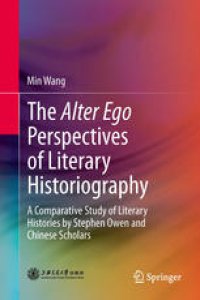
Ebook: The Alter Ego Perspectives of Literary Historiography: A Comparative Study of Literary Histories by Stephen Owen and Chinese Scholars
Author: Min Wang (auth.)
- Tags: Literacy
- Year: 2013
- Publisher: Springer-Verlag Berlin Heidelberg
- Edition: 1
- Language: English
- pdf
This book mainly discusses about the alter ego perspectives in literary historiography. This comparative analysis of the major Chinese literary histories in China and in the West brings to light the alter ego perspectives of Stephen Owen in literary historiography. The most interesting part of the book will be the interpretation of new notions and perspectives proposed by Stephen Owen, especially in the newly published The Cambridge History of Chinese Literature (2010). This book gives a detailed overview about the different stages of writing Chinese literary history and the different modes of literary historiography in China and in the West. Two case studies of Chinese poems are made on the notion of discursive communities and the Cultural Tang. Readers will a better understanding about the paradigm of literary historiography and the interrelationships between the different modes of literary historiography and the intellectual history.
Min Wang’s book is a unique contribution to Chinese studies. Starting with a detailed survey of dozens of histories of Chinese literature authored in the past century by Chinese, Japanese, and Western scholars, she applies a highly sophisticated analysis to what she calls “literary historiography.” She proceeds in the bulk of the book to a close consideration of Stephen Owen’s particular innovations in this field, focusing on an abundance of specific textual examples. This book sets a new standard for literary meta-history in Sinology.
Paul W. Kroll
Professor of Chinese
University of Colorado
Paul W. Kroll
Professor of Chinese
University of Colorado
Min Wang’s book is a unique contribution to Chinese studies. Starting with a detailed survey of dozens of histories of Chinese literature authored in the past century by Chinese, Japanese, and Western scholars, she applies a highly sophisticated analysis to what she calls “literary historiography.” She proceeds in the bulk of the book to a close consideration of Stephen Owen’s particular innovations in this field, focusing on an abundance of specific textual examples. This book sets a new standard for literary meta-history in Sinology.
Paul W. Kroll
Professor of Chinese
University of Colorado
Paul W. Kroll
Professor of Chinese
University of Colorado
Content:
Front Matter....Pages i-xxvii
Introduction....Pages 1-8
An Overview of Chinese Literary History....Pages 9-49
The Notion of Discursive Communities: A Case Study of Huaigu Poems....Pages 51-84
The Cultural Tang and Temple Visiting Poems....Pages 85-129
The Alter Ego Perspectives and Literary Historiography....Pages 131-170
Conclusion and Implications....Pages 171-175
Back Matter....Pages 177-184
Min Wang’s book is a unique contribution to Chinese studies. Starting with a detailed survey of dozens of histories of Chinese literature authored in the past century by Chinese, Japanese, and Western scholars, she applies a highly sophisticated analysis to what she calls “literary historiography.” She proceeds in the bulk of the book to a close consideration of Stephen Owen’s particular innovations in this field, focusing on an abundance of specific textual examples. This book sets a new standard for literary meta-history in Sinology.
Paul W. Kroll
Professor of Chinese
University of Colorado
Paul W. Kroll
Professor of Chinese
University of Colorado
Content:
Front Matter....Pages i-xxvii
Introduction....Pages 1-8
An Overview of Chinese Literary History....Pages 9-49
The Notion of Discursive Communities: A Case Study of Huaigu Poems....Pages 51-84
The Cultural Tang and Temple Visiting Poems....Pages 85-129
The Alter Ego Perspectives and Literary Historiography....Pages 131-170
Conclusion and Implications....Pages 171-175
Back Matter....Pages 177-184
....